LSE Dissertation: Examining Failures in WTO Negotiation Agreements
VerifiedAdded on 2023/06/11
|8
|1470
|262
Essay
AI Summary
This essay delves into the complexities of World Trade Organization (WTO) negotiations, particularly focusing on why some countries, especially developing nations, struggle to reach successful agreements. It begins by introducing the WTO, its aims, and objectives, including the principle of treating all members equally and reducing trade barriers. The literature review highlights the Doha Round table talks, which aimed to integrate developing countries into the global marketplace but have been largely unsuccessful. The essay attributes these failures to the dominance of economic heavyweights like the USA, EU, China, and India, which often leads to developing countries being bullied in tariff and regulation negotiations. Protectionism and stringent negotiation terms, such as the principle of single undertaking, are also identified as significant barriers. The methodology involves extensive research through interviews, observations, and questionnaires, emphasizing the power dynamics between large and developing economies. The essay concludes by noting that disputes and the sluggish nature of talks further hinder progress, ultimately affecting the benefits that developing countries hoped to gain from international trade, such as smoother trade flows and fair dispute resolution mechanisms. Desklib provides access to similar documents for students.
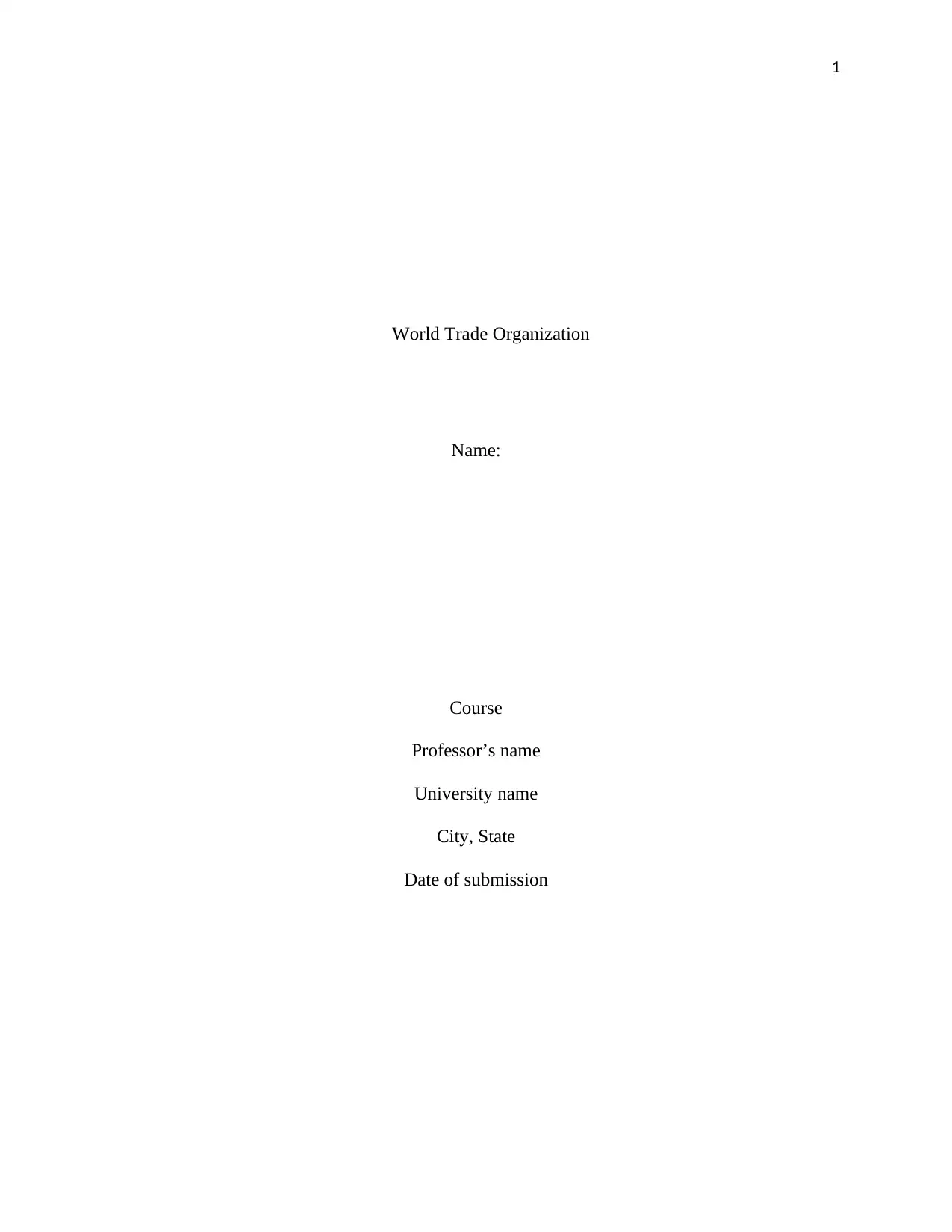
1
World Trade Organization
Name:
Course
Professor’s name
University name
City, State
Date of submission
World Trade Organization
Name:
Course
Professor’s name
University name
City, State
Date of submission
Paraphrase This Document
Need a fresh take? Get an instant paraphrase of this document with our AI Paraphraser
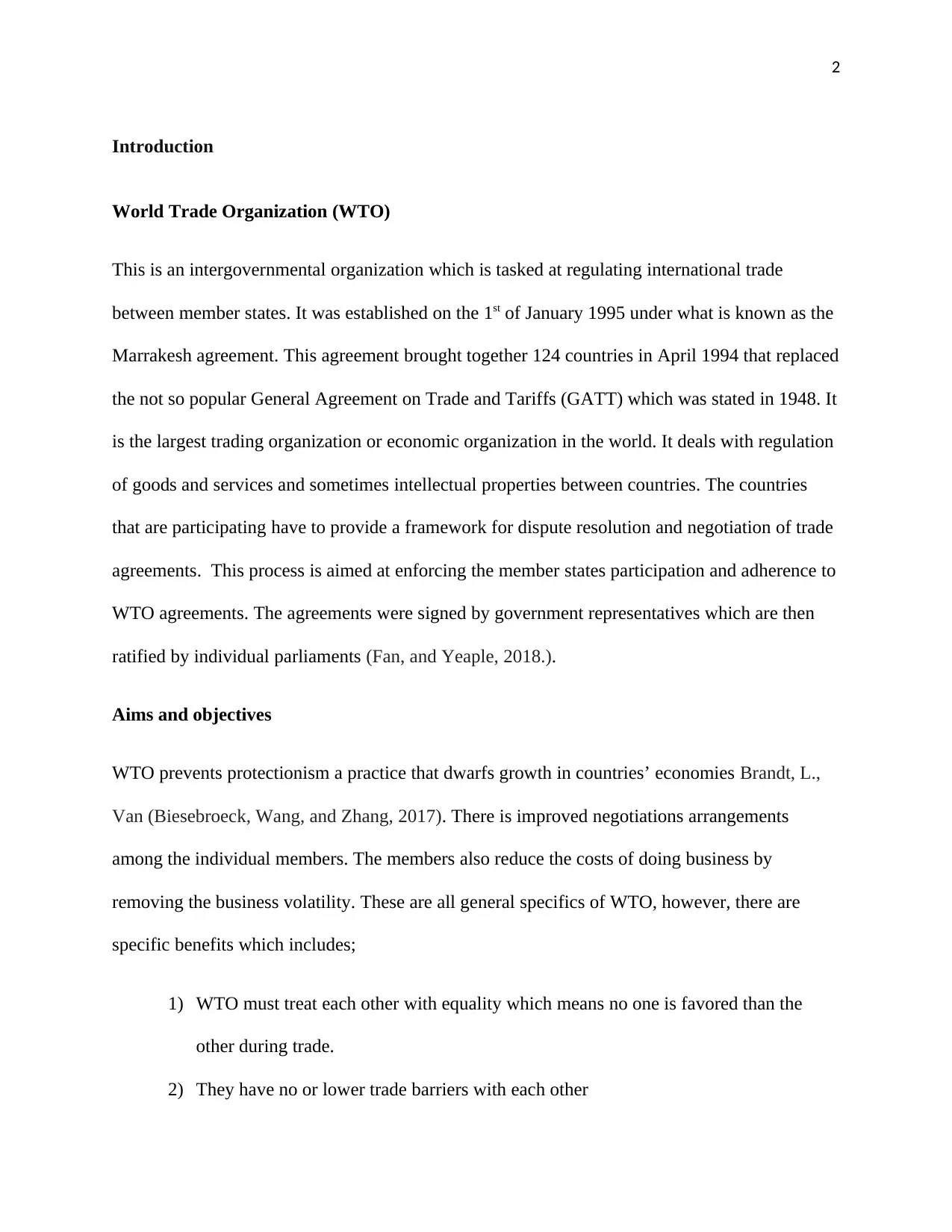
2
Introduction
World Trade Organization (WTO)
This is an intergovernmental organization which is tasked at regulating international trade
between member states. It was established on the 1st of January 1995 under what is known as the
Marrakesh agreement. This agreement brought together 124 countries in April 1994 that replaced
the not so popular General Agreement on Trade and Tariffs (GATT) which was stated in 1948. It
is the largest trading organization or economic organization in the world. It deals with regulation
of goods and services and sometimes intellectual properties between countries. The countries
that are participating have to provide a framework for dispute resolution and negotiation of trade
agreements. This process is aimed at enforcing the member states participation and adherence to
WTO agreements. The agreements were signed by government representatives which are then
ratified by individual parliaments (Fan, and Yeaple, 2018.).
Aims and objectives
WTO prevents protectionism a practice that dwarfs growth in countries’ economies Brandt, L.,
Van (Biesebroeck, Wang, and Zhang, 2017). There is improved negotiations arrangements
among the individual members. The members also reduce the costs of doing business by
removing the business volatility. These are all general specifics of WTO, however, there are
specific benefits which includes;
1) WTO must treat each other with equality which means no one is favored than the
other during trade.
2) They have no or lower trade barriers with each other
Introduction
World Trade Organization (WTO)
This is an intergovernmental organization which is tasked at regulating international trade
between member states. It was established on the 1st of January 1995 under what is known as the
Marrakesh agreement. This agreement brought together 124 countries in April 1994 that replaced
the not so popular General Agreement on Trade and Tariffs (GATT) which was stated in 1948. It
is the largest trading organization or economic organization in the world. It deals with regulation
of goods and services and sometimes intellectual properties between countries. The countries
that are participating have to provide a framework for dispute resolution and negotiation of trade
agreements. This process is aimed at enforcing the member states participation and adherence to
WTO agreements. The agreements were signed by government representatives which are then
ratified by individual parliaments (Fan, and Yeaple, 2018.).
Aims and objectives
WTO prevents protectionism a practice that dwarfs growth in countries’ economies Brandt, L.,
Van (Biesebroeck, Wang, and Zhang, 2017). There is improved negotiations arrangements
among the individual members. The members also reduce the costs of doing business by
removing the business volatility. These are all general specifics of WTO, however, there are
specific benefits which includes;
1) WTO must treat each other with equality which means no one is favored than the
other during trade.
2) They have no or lower trade barriers with each other
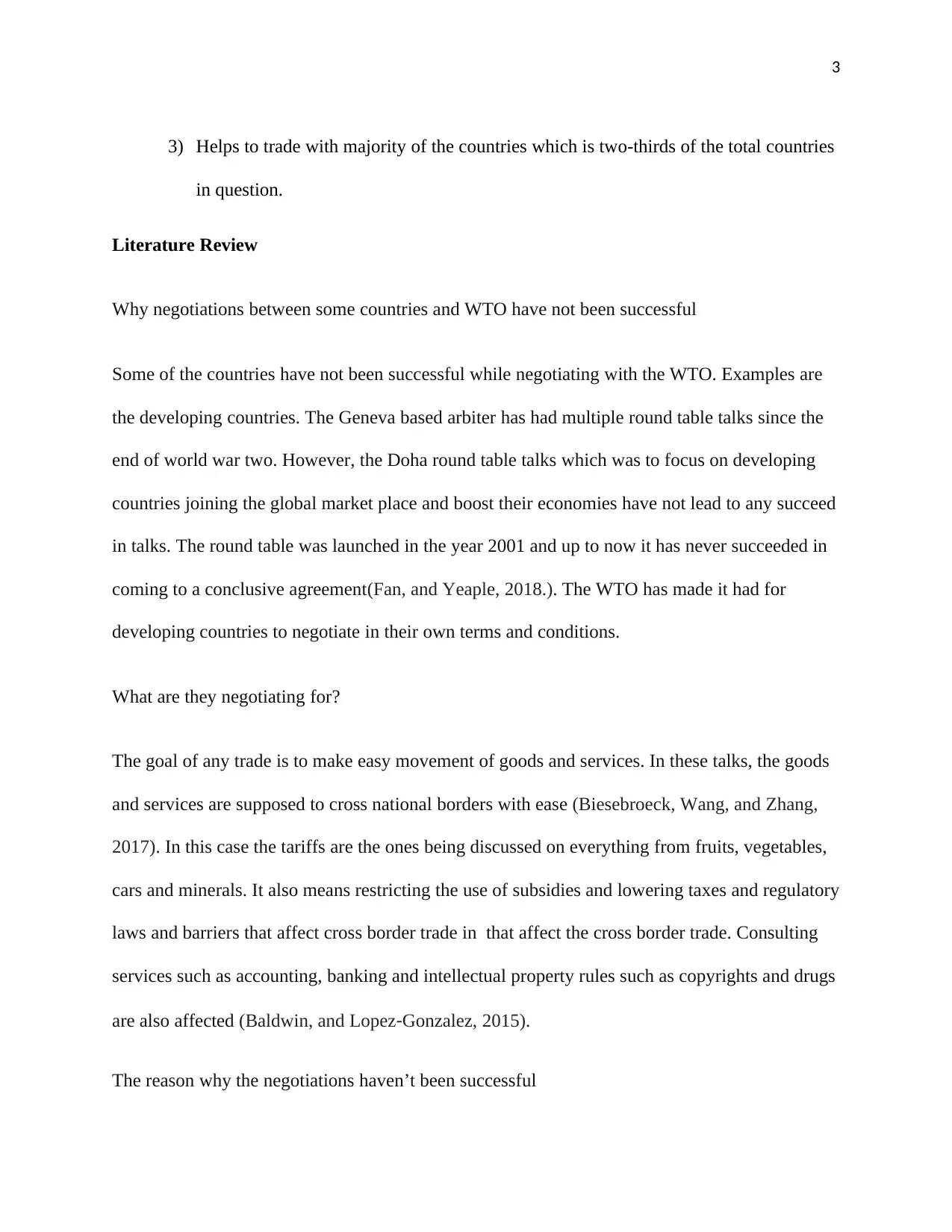
3
3) Helps to trade with majority of the countries which is two-thirds of the total countries
in question.
Literature Review
Why negotiations between some countries and WTO have not been successful
Some of the countries have not been successful while negotiating with the WTO. Examples are
the developing countries. The Geneva based arbiter has had multiple round table talks since the
end of world war two. However, the Doha round table talks which was to focus on developing
countries joining the global market place and boost their economies have not lead to any succeed
in talks. The round table was launched in the year 2001 and up to now it has never succeeded in
coming to a conclusive agreement(Fan, and Yeaple, 2018.). The WTO has made it had for
developing countries to negotiate in their own terms and conditions.
What are they negotiating for?
The goal of any trade is to make easy movement of goods and services. In these talks, the goods
and services are supposed to cross national borders with ease (Biesebroeck, Wang, and Zhang,
2017). In this case the tariffs are the ones being discussed on everything from fruits, vegetables,
cars and minerals. It also means restricting the use of subsidies and lowering taxes and regulatory
laws and barriers that affect cross border trade in that affect the cross border trade. Consulting
services such as accounting, banking and intellectual property rules such as copyrights and drugs
are also affected (Baldwin, and Lopez‐Gonzalez, 2015).
The reason why the negotiations haven’t been successful
3) Helps to trade with majority of the countries which is two-thirds of the total countries
in question.
Literature Review
Why negotiations between some countries and WTO have not been successful
Some of the countries have not been successful while negotiating with the WTO. Examples are
the developing countries. The Geneva based arbiter has had multiple round table talks since the
end of world war two. However, the Doha round table talks which was to focus on developing
countries joining the global market place and boost their economies have not lead to any succeed
in talks. The round table was launched in the year 2001 and up to now it has never succeeded in
coming to a conclusive agreement(Fan, and Yeaple, 2018.). The WTO has made it had for
developing countries to negotiate in their own terms and conditions.
What are they negotiating for?
The goal of any trade is to make easy movement of goods and services. In these talks, the goods
and services are supposed to cross national borders with ease (Biesebroeck, Wang, and Zhang,
2017). In this case the tariffs are the ones being discussed on everything from fruits, vegetables,
cars and minerals. It also means restricting the use of subsidies and lowering taxes and regulatory
laws and barriers that affect cross border trade in that affect the cross border trade. Consulting
services such as accounting, banking and intellectual property rules such as copyrights and drugs
are also affected (Baldwin, and Lopez‐Gonzalez, 2015).
The reason why the negotiations haven’t been successful
⊘ This is a preview!⊘
Do you want full access?
Subscribe today to unlock all pages.

Trusted by 1+ million students worldwide
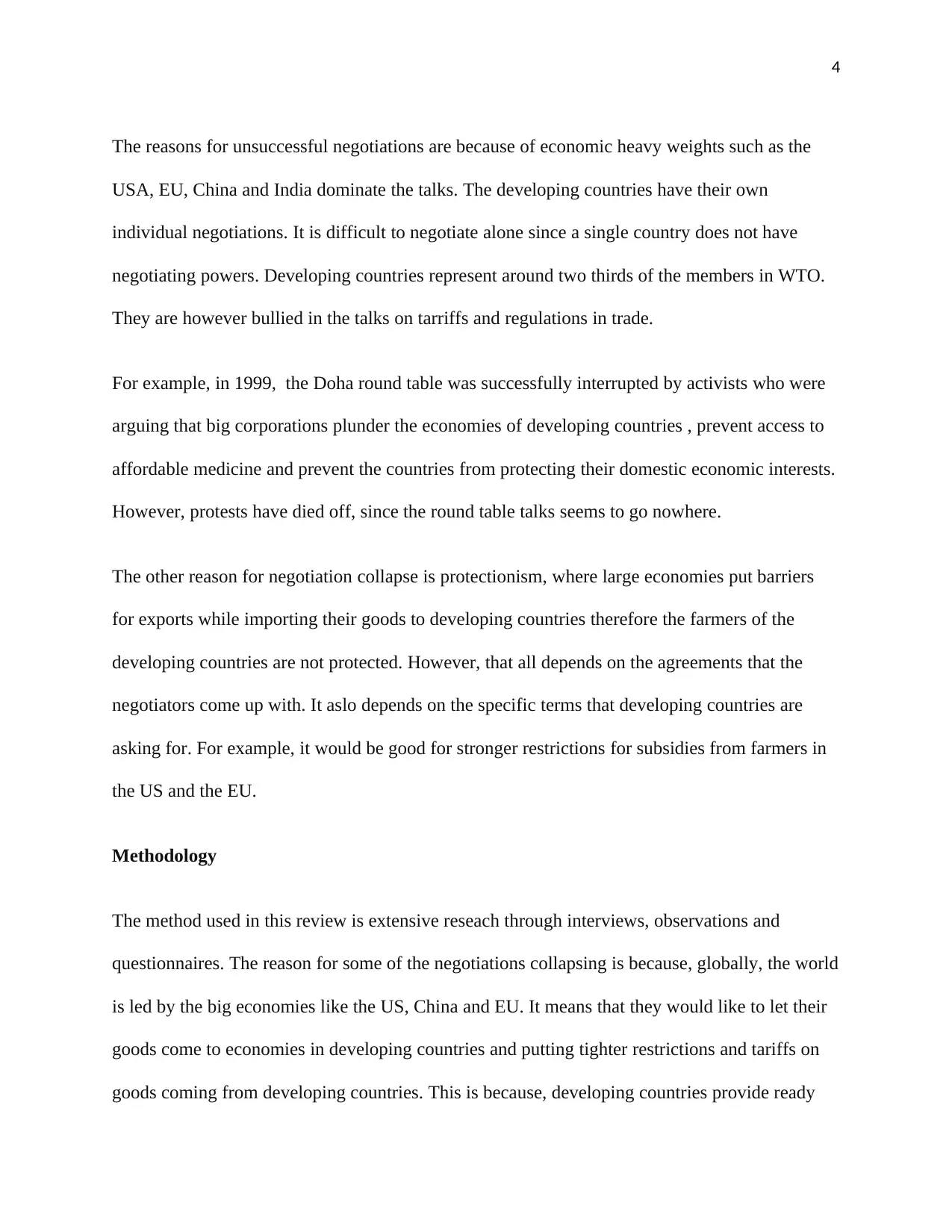
4
The reasons for unsuccessful negotiations are because of economic heavy weights such as the
USA, EU, China and India dominate the talks. The developing countries have their own
individual negotiations. It is difficult to negotiate alone since a single country does not have
negotiating powers. Developing countries represent around two thirds of the members in WTO.
They are however bullied in the talks on tarriffs and regulations in trade.
For example, in 1999, the Doha round table was successfully interrupted by activists who were
arguing that big corporations plunder the economies of developing countries , prevent access to
affordable medicine and prevent the countries from protecting their domestic economic interests.
However, protests have died off, since the round table talks seems to go nowhere.
The other reason for negotiation collapse is protectionism, where large economies put barriers
for exports while importing their goods to developing countries therefore the farmers of the
developing countries are not protected. However, that all depends on the agreements that the
negotiators come up with. It aslo depends on the specific terms that developing countries are
asking for. For example, it would be good for stronger restrictions for subsidies from farmers in
the US and the EU.
Methodology
The method used in this review is extensive reseach through interviews, observations and
questionnaires. The reason for some of the negotiations collapsing is because, globally, the world
is led by the big economies like the US, China and EU. It means that they would like to let their
goods come to economies in developing countries and putting tighter restrictions and tariffs on
goods coming from developing countries. This is because, developing countries provide ready
The reasons for unsuccessful negotiations are because of economic heavy weights such as the
USA, EU, China and India dominate the talks. The developing countries have their own
individual negotiations. It is difficult to negotiate alone since a single country does not have
negotiating powers. Developing countries represent around two thirds of the members in WTO.
They are however bullied in the talks on tarriffs and regulations in trade.
For example, in 1999, the Doha round table was successfully interrupted by activists who were
arguing that big corporations plunder the economies of developing countries , prevent access to
affordable medicine and prevent the countries from protecting their domestic economic interests.
However, protests have died off, since the round table talks seems to go nowhere.
The other reason for negotiation collapse is protectionism, where large economies put barriers
for exports while importing their goods to developing countries therefore the farmers of the
developing countries are not protected. However, that all depends on the agreements that the
negotiators come up with. It aslo depends on the specific terms that developing countries are
asking for. For example, it would be good for stronger restrictions for subsidies from farmers in
the US and the EU.
Methodology
The method used in this review is extensive reseach through interviews, observations and
questionnaires. The reason for some of the negotiations collapsing is because, globally, the world
is led by the big economies like the US, China and EU. It means that they would like to let their
goods come to economies in developing countries and putting tighter restrictions and tariffs on
goods coming from developing countries. This is because, developing countries provide ready
Paraphrase This Document
Need a fresh take? Get an instant paraphrase of this document with our AI Paraphraser
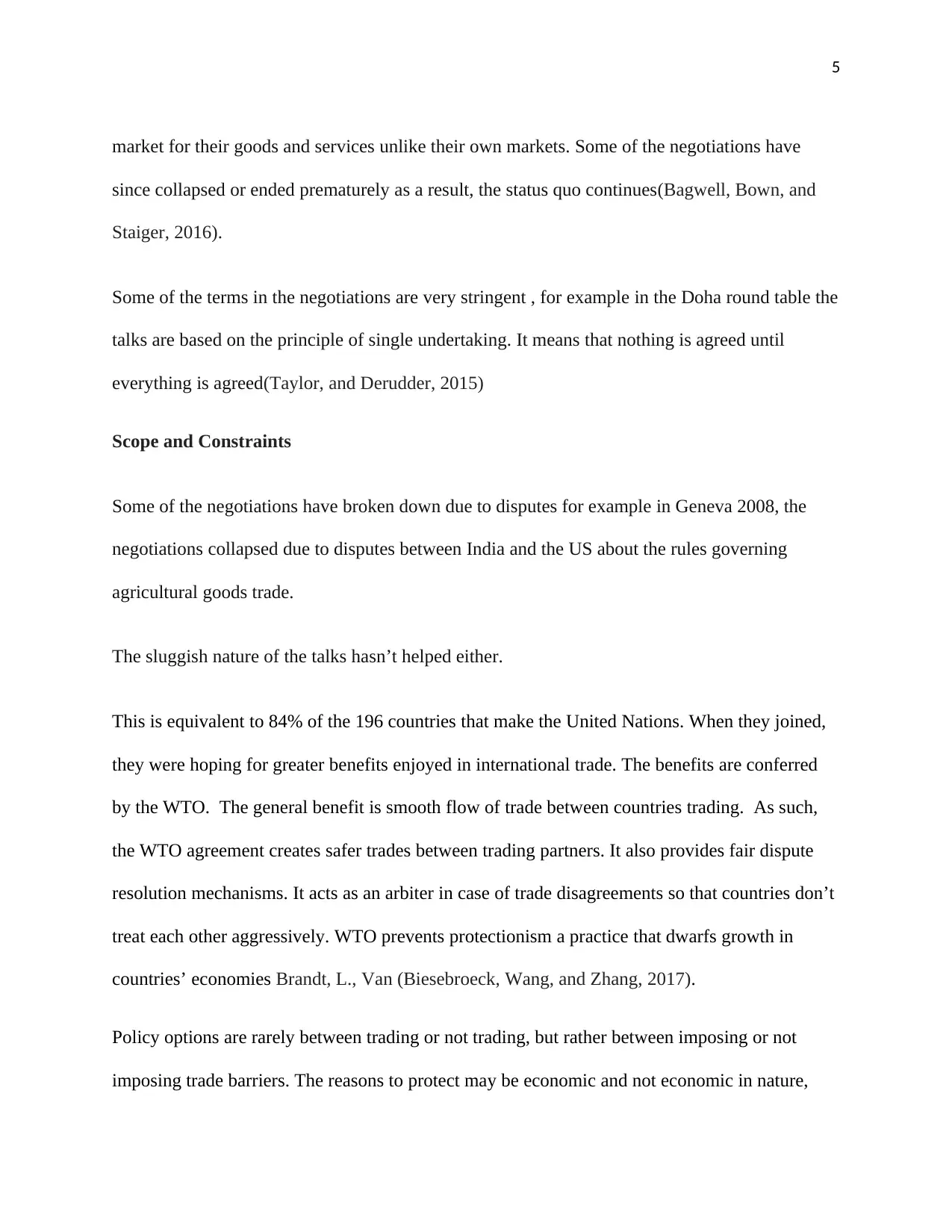
5
market for their goods and services unlike their own markets. Some of the negotiations have
since collapsed or ended prematurely as a result, the status quo continues(Bagwell, Bown, and
Staiger, 2016).
Some of the terms in the negotiations are very stringent , for example in the Doha round table the
talks are based on the principle of single undertaking. It means that nothing is agreed until
everything is agreed(Taylor, and Derudder, 2015)
Scope and Constraints
Some of the negotiations have broken down due to disputes for example in Geneva 2008, the
negotiations collapsed due to disputes between India and the US about the rules governing
agricultural goods trade.
The sluggish nature of the talks hasn’t helped either.
This is equivalent to 84% of the 196 countries that make the United Nations. When they joined,
they were hoping for greater benefits enjoyed in international trade. The benefits are conferred
by the WTO. The general benefit is smooth flow of trade between countries trading. As such,
the WTO agreement creates safer trades between trading partners. It also provides fair dispute
resolution mechanisms. It acts as an arbiter in case of trade disagreements so that countries don’t
treat each other aggressively. WTO prevents protectionism a practice that dwarfs growth in
countries’ economies Brandt, L., Van (Biesebroeck, Wang, and Zhang, 2017).
Policy options are rarely between trading or not trading, but rather between imposing or not
imposing trade barriers. The reasons to protect may be economic and not economic in nature,
market for their goods and services unlike their own markets. Some of the negotiations have
since collapsed or ended prematurely as a result, the status quo continues(Bagwell, Bown, and
Staiger, 2016).
Some of the terms in the negotiations are very stringent , for example in the Doha round table the
talks are based on the principle of single undertaking. It means that nothing is agreed until
everything is agreed(Taylor, and Derudder, 2015)
Scope and Constraints
Some of the negotiations have broken down due to disputes for example in Geneva 2008, the
negotiations collapsed due to disputes between India and the US about the rules governing
agricultural goods trade.
The sluggish nature of the talks hasn’t helped either.
This is equivalent to 84% of the 196 countries that make the United Nations. When they joined,
they were hoping for greater benefits enjoyed in international trade. The benefits are conferred
by the WTO. The general benefit is smooth flow of trade between countries trading. As such,
the WTO agreement creates safer trades between trading partners. It also provides fair dispute
resolution mechanisms. It acts as an arbiter in case of trade disagreements so that countries don’t
treat each other aggressively. WTO prevents protectionism a practice that dwarfs growth in
countries’ economies Brandt, L., Van (Biesebroeck, Wang, and Zhang, 2017).
Policy options are rarely between trading or not trading, but rather between imposing or not
imposing trade barriers. The reasons to protect may be economic and not economic in nature,

6
including food security. However, trade measures are usually not the most direct nor the most
efficient to achieve these objectives.
including food security. However, trade measures are usually not the most direct nor the most
efficient to achieve these objectives.
⊘ This is a preview!⊘
Do you want full access?
Subscribe today to unlock all pages.

Trusted by 1+ million students worldwide
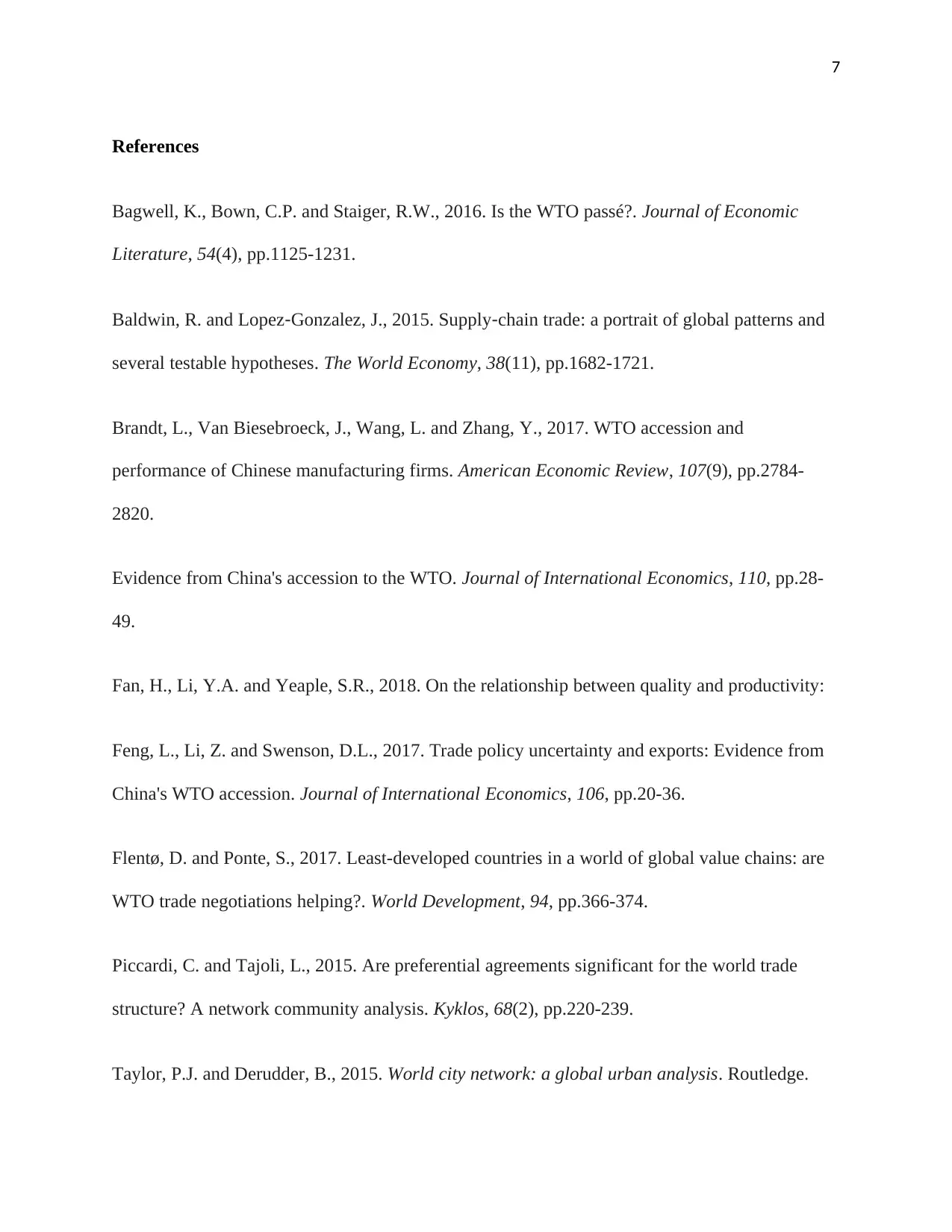
7
References
Bagwell, K., Bown, C.P. and Staiger, R.W., 2016. Is the WTO passé?. Journal of Economic
Literature, 54(4), pp.1125-1231.
Baldwin, R. and Lopez‐Gonzalez, J., 2015. Supply‐chain trade: a portrait of global patterns and
several testable hypotheses. The World Economy, 38(11), pp.1682-1721.
Brandt, L., Van Biesebroeck, J., Wang, L. and Zhang, Y., 2017. WTO accession and
performance of Chinese manufacturing firms. American Economic Review, 107(9), pp.2784-
2820.
Evidence from China's accession to the WTO. Journal of International Economics, 110, pp.28-
49.
Fan, H., Li, Y.A. and Yeaple, S.R., 2018. On the relationship between quality and productivity:
Feng, L., Li, Z. and Swenson, D.L., 2017. Trade policy uncertainty and exports: Evidence from
China's WTO accession. Journal of International Economics, 106, pp.20-36.
Flentø, D. and Ponte, S., 2017. Least-developed countries in a world of global value chains: are
WTO trade negotiations helping?. World Development, 94, pp.366-374.
Piccardi, C. and Tajoli, L., 2015. Are preferential agreements significant for the world trade
structure? A network community analysis. Kyklos, 68(2), pp.220-239.
Taylor, P.J. and Derudder, B., 2015. World city network: a global urban analysis. Routledge.
References
Bagwell, K., Bown, C.P. and Staiger, R.W., 2016. Is the WTO passé?. Journal of Economic
Literature, 54(4), pp.1125-1231.
Baldwin, R. and Lopez‐Gonzalez, J., 2015. Supply‐chain trade: a portrait of global patterns and
several testable hypotheses. The World Economy, 38(11), pp.1682-1721.
Brandt, L., Van Biesebroeck, J., Wang, L. and Zhang, Y., 2017. WTO accession and
performance of Chinese manufacturing firms. American Economic Review, 107(9), pp.2784-
2820.
Evidence from China's accession to the WTO. Journal of International Economics, 110, pp.28-
49.
Fan, H., Li, Y.A. and Yeaple, S.R., 2018. On the relationship between quality and productivity:
Feng, L., Li, Z. and Swenson, D.L., 2017. Trade policy uncertainty and exports: Evidence from
China's WTO accession. Journal of International Economics, 106, pp.20-36.
Flentø, D. and Ponte, S., 2017. Least-developed countries in a world of global value chains: are
WTO trade negotiations helping?. World Development, 94, pp.366-374.
Piccardi, C. and Tajoli, L., 2015. Are preferential agreements significant for the world trade
structure? A network community analysis. Kyklos, 68(2), pp.220-239.
Taylor, P.J. and Derudder, B., 2015. World city network: a global urban analysis. Routledge.
Paraphrase This Document
Need a fresh take? Get an instant paraphrase of this document with our AI Paraphraser

8
1 out of 8
Related Documents
Your All-in-One AI-Powered Toolkit for Academic Success.
+13062052269
info@desklib.com
Available 24*7 on WhatsApp / Email
![[object Object]](/_next/static/media/star-bottom.7253800d.svg)
Unlock your academic potential
Copyright © 2020–2026 A2Z Services. All Rights Reserved. Developed and managed by ZUCOL.




